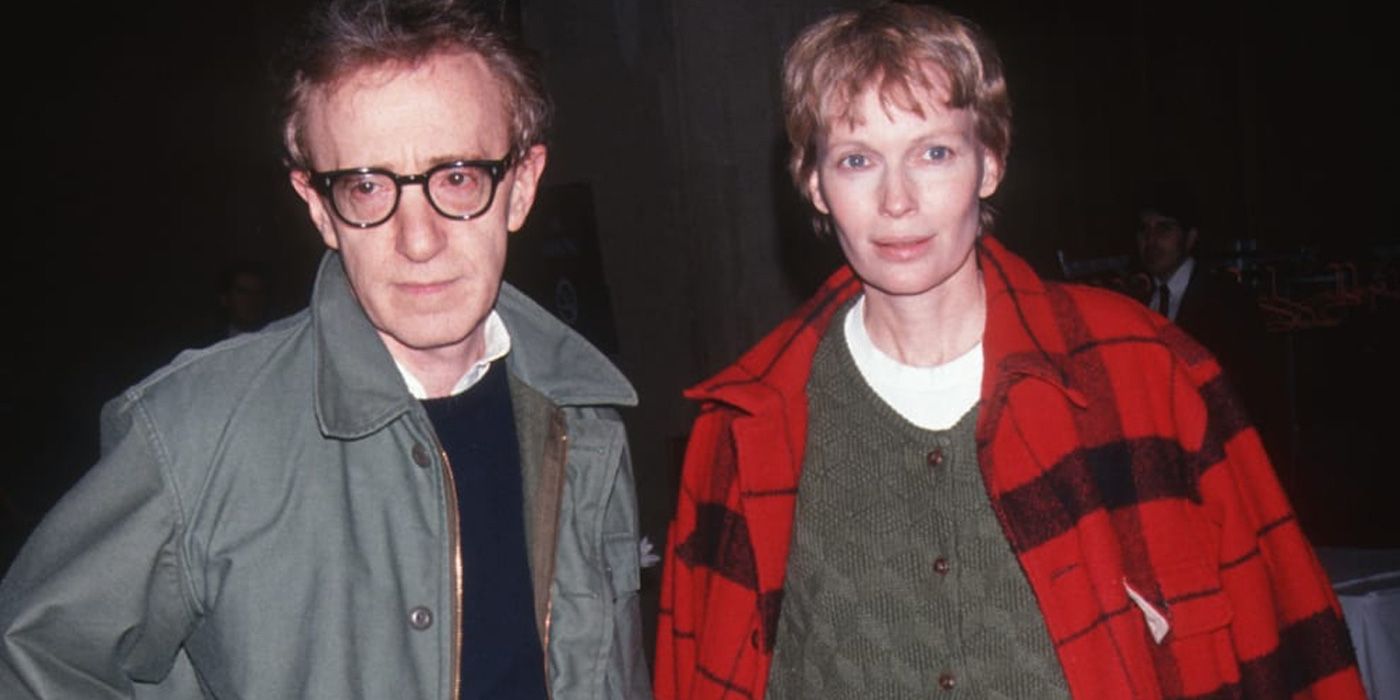Despite what the title might imply, don't go into Allen v. Farrow expecting to hear more than one side of a story. The four-part HBO documentary series directed by Kirby Dick and Amy Ziering (On the Record) covers the chaos that ensued when iconic director Woody Allen was accused of molesting his adopted daughter Dylan Farrow in 1992. But, really, what it does is present the case Mia Farrow has been trying to make, then and now, about Allen's alleged behavior and its impact upon her family. And this time, those allegations have finally become completely unforgettable.
Allen, Soon-Yi Previn, and other potential Allen supporters are not interviewed for the series — instead, audiobook excerpts from Allen's recent memoir Apropos of Nothing are presented in contrast to Farrow's version of events, which otherwise dominate the narrative. This is in part because the Farrow side of things is supported with some thorough and damning evidence, plus over a dozen interviews with family, friends, and experts to support Farrow's point-of-view. In many respects, Farrow might be the underdog in this story, but she does have Carly Simon and Gloria Steinem in her corner.
If the fog of memory clouds any clear recollection of what exactly went down in 1992, Allen v. Farrow will fix that for you, laying out the basic facts: Allen and Farrow's 12-year relationship, his distant relationship with her many children except for young Dylan, the discovery of his affair with Previn, the day he is alleged to have abused Dylan, and the subsequent legal actions that ensued, including Allen suing Farrow for custody.
Despite those basic facts, there are so many swirling unknowns in the above when it comes to timelines, when it comes to locations, when it comes to the basic question of who must be lying? As Allen v. Farrow presents it, much of that is the work of the powerful publicity machine employed by Allen to ensure that none of this potential stuck to him permanently — which, y'know, worked; for nearly three decades, Allen continued to make his films with some of the most notable actors in Hollywood.
That is a fact which does get addressed in depth by the series towards the end, but before the stars speak we get to know Dylan Farrow incredibly well. After coming forward in the post-#MeToo era with her story, Dylan puts herself in front of the camera to give her version of events, from her memories of what happened that day in the attic, to the also-traumatic memories of being interrogated by law enforcement and abuse experts about her experience. It's one of the bravest things you'll ever see, and will make you regret ever brushing by the details of what Woody did.
When it comes to discussing the concept of separating the artist from the art, Allen is the platonic ideal of this discussion because so many of his films are entwined with his own comic identity, and that comic identity includes well-established tropes like young women sexually obsessed with much older men. (Allen v. Farrow includes a lot of clips from Manhattan, all featuring the relationship between Allen's 42-year-old protagonist and the 17-year-old girl played by Mariel Hemingway.) It's true that we've had decades to process Allen's extremely unconventional relationship with Previn — there are Collider staff members younger than some of the jokes that have been made about it. But what the documentary puts forward is the idea that Allen and Previn's relationship was almost a smokescreen for the very serious allegations of child abuse that Allen was eventually able to brush aside.
On a craft level, Allen v. Farrow keeps things relatively simple, relying largely on the vast well of Farrow family home videos and photos for B-roll. (Over halfway through the series, the screeners included the surprising addition of voice-over, which is a big stylistic shift to make so abruptly.) While it's not the most avant-guard of pieces, that straightforward approach helps elevate the wealth of first-hand materials included, some of which proves genuinely haunting.
For me, the taped phone exchanges that occurred around the time of the trial were perhaps the most difficult to experience, as Allen's cold approach towards Farrow is hard not to interpret as at times downright sociopathic. Listening to him patronize and belittle his former partner, it becomes easy to understand why the battle between the two of them managed to get so vicious. It also becomes impossible to think of hearing Allen's voice and wanting to laugh.
Allen's most recent work has barely been given any sort of release, but that hasn't affected his past classics: There are currently six different Woody Allen movies streaming on HBO Max, five of which star Mia Farrow. (The sixth is 2006's Scoop, starring Hugh Jackman and Scarlett Johansson.) Who knows how much longer they'll stay available once Allen v. Farrow finishes its run, though, because after watching this series, it's hard to imagine wanting to watch one of those films ever again.
Grade: B+
Allen v. Farrow premieres Sunday, February 21 at 9 pm on HBO, with subsequent episodes airing Sundays at the same time. For more, check out the best documentaries of 2020.

